During the lesson, the information for you to know is written in regular type, and what we suggest speaking or reading aloud to children is in bold. All resources for this lesson, including the Teacher Guide, Student Page, Family Connection Card, and other resources can be downloaded in a ZIP file by clicking on the following link:
In some lessons you will find "resource articles." These are articles written by experts from around the world to help equip you for your work with children and adolescents. Share them with parents or guardians if you consider it appropriate.
Seek the Lord while he may be found; call on him while he is near. Let the wicked forsake their ways and the unrighteous their thoughts. Let them turn to the Lord, and he will have mercy on them, and to our God, for he will freely pardon.
Isaiah 55:6–7
A woman named Corrie ten Boom was put into a prison camp during World War II. Some of her family members died in the camp, but Corrie was released by mistake just 1 week before she would have been executed. Many years later, one of the former guards approached her. He told Corrie that he had become a Christian and asked for her forgiveness. Anger boiled inside of her. But then she realized that not forgiving him was a sin. She wrote, “Jesus Christ had died for this man; was I going to ask for more?”
This story reminds us that forgiveness begins with Jesus. We may not want to forgive, and we may not want to ask for forgiveness. But Christ paid the price for all sins. Are there people you have struggled to forgive because of your pride or anger? Do you need to ask for forgiveness but have not because of your shame or lack of courage? Have you judged yourself harshly for something and not allowed God’s forgiveness to cleanse you? Do not wait any longer—go to Him now. Then reconcile with others. Pray that you will experience the certainty that Jesus paid the price for all of our sins—and that His grace is enough.
Encourage the students to ask their family members about situations when someone was not punished for doing something wrong. They can then share that God can restore us in even our most difficult circumstances.
Teacher Tip: If possible, email or text the Family Connection Card to the families of your students.
Greet your students. As they arrive, ask them about the biggest body of water they have seen, such as a lake or ocean. Allow 2–3 students to respond to the questions below.
In nature, water moves and changes things. It may be in big waves like the pounding surf of an ocean. Or it may be in a steady current like the rushing of a river. It may be in gentle lapping of water on the shore of a lake. In nature, we see that water can change the shape of things. Water can change sharp, jagged rocks into smooth stones. Water can carve deep crevices into mountains and wash away hillsides.
Bring out the pan or basin of dirt and the bottle of water. Pour the water slowly onto the dirt, moving the water stream to create marks where the water is poured. (You can also pour water directly onto the dirt or sand on the ground.)
Answers might include: the water moved or changed the dirt.
Forgiveness is like water. Sometimes forgiveness can come like a wave that washes out hurt and anger. Other times forgiveness works over time like a steady stream as we take small steps every day toward peace and healing. Whether forgiveness happens at once or gradually, it changes the landscapes of our hearts. The sharp edges of our pride, anger, and selfishness are softened. Our pain and hurt are slowly washed away. Forgiveness changes everything.
When someone does something wrong to you, you have 3 options for how you may respond.
The first option is to choose to ignore what has happened. You may act as though nothing happened at all. This type of reaction can be dangerous for your physical and emotional health. Not recognizing and releasing your painful emotions can cause problems with your heart. It can make you ill in other ways. It can also make it difficult for you to have healthy relationships with others.
The second response you might choose is to seek revenge. You may decide the other person should pay for what he has done. Responding in this way can cause you to put yourself in harmful situations, such as breaking the law or dealing with the guilt of having harmed another person. Revenge is never a positive solution.
A third possible response is to forgive. This may seem like the hardest choice of all. But forgiveness is not just for the benefit of the other person—it is also a good solution for you.
Here are some specific ways that forgiving is good for us:
Forgiveness helps us to have healthier relationships.
When we forgive others, we experience less anxiety, stress, and hostility in our lives.
There are physical benefits to forgiveness, such as healthier blood pressure and a stronger immune system.
When you forgive others, you are less likely to become depressed, and you usually feel better about yourself. Forgiving others can even help you to forgive yourself!
Though forgiving others is good, it can still be difficult.
Answers may include: If the person who hurt you is someone you trusted or loved, if the person is continuing to hurt you, or if the situation is dangerous or morally wrong.
If you have been badly hurt, it can take time for that pain to heal. It may be difficult to let go of the anger, bitterness, pain, or feelings of abandonment that fill your heart. Sometimes it is especially hard to forgive someone who is close to you, such as a parent or a friend. Pain can be deep when it is caused by people you should be able to trust.
It is hard to forgive someone when you believe that person deserves punishment. You want the other person to hurt the same way you do.
Divide the students into 3 groups. Give each group a copy of 1 of the situations at the end of this lesson. If you have a large class, more than 1 group can use each situation. If you do not have enough time for all 3 situations, you can use 1 or 2 of them. Each person in the group will choose a role to act out. Give the groups 5 minutes to plan how they will add dialogue and act out endings to these situations.
Each group has a situation to act out. The situation has been given to you, but you will create your own ending for the situation. Your group can choose any of the 3 responses we talked about earlier: ignore what happened, seek revenge, or forgive.
After about 5 minutes, read the first situation to the entire class and have that group act out the ending that they created. Then ask the questions that follow the situation.
Situation 1: Amnon could not stop thinking about his half-sister, Tamar. So he pretended he was ill and asked his father, King David, to have Tamar prepare food for him. So Tamar went to Amnon’s house and baked some cakes. When Tamar brought the cakes into Amnon’s bedroom, Amnon tried to convince her to have sex with him. But Tamar refused because she knew it was wrong. Amnon raped her and sent her away in shame. His love for Tamar turned to hate.
This is how the story actually ends, as it is recorded in the Bible in 2 Samuel 13.
Ask a student to read 2 Samuel 13:20–23, 28–29 aloud from the Bible.
Her brother Absalom said to her, “Has that Amnon, your brother, been with you? Be quiet for now, my sister; he is your brother. Don’t take this thing to heart.” And Tamar lived in her brother Absalom’s house, a desolate woman. When King David heard all this, he was furious. And Absalom never said a word to Amnon, either good or bad; he hated Amnon because he had disgraced his sister Tamar.
Two years later, when Absalom’s sheepshearers were at Baal Hazor near the border of Ephraim, he invited all the king’s sons to come there. Absalom ordered his men, “Listen! When Amnon is in high spirits from drinking wine and I say to you, ‘Strike Amnon down,’ then kill him. Don’t be afraid. Haven’t I given you this order? Be strong and brave.” So Absalom’s men did to Amnon what Absalom had ordered.
2 Samuel 13:20–23, 28–29
Show The Action Bible image of the attack on Amnon if possible.
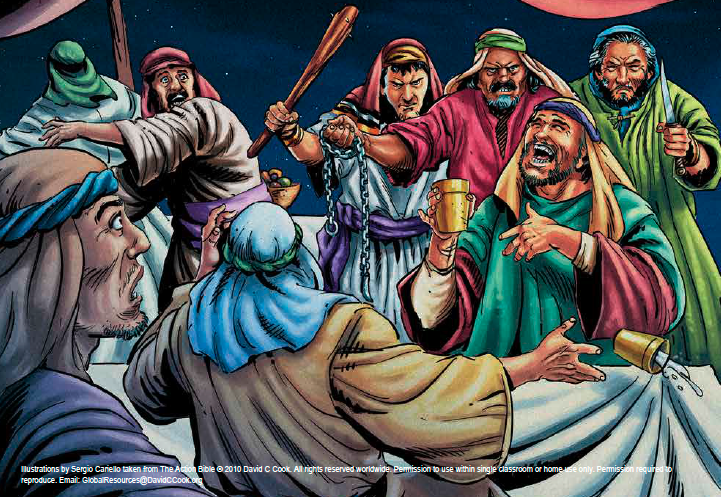
Repeat these steps for Situations 2 and 3.
Situation 2: Korah and 250 other Israelites rebelled against the leadership of Moses and his brother, Aaron. Korah and his men accused Moses and Aaron of considering themselves more important than all the people. They also blamed Moses and Aaron for all the difficulties they were facing. Moses and Aaron had led the people of Israel faithfully because God had called them to lead. But Korah and this mob of 250 people rose up against Moses and Aaron.
Now let’s find out how the story ends in the Bible.
Ask a student to read Numbers 16:20–24, 31–32 aloud from the Bible.
Show The Action Bible image of God’s judgement on Korah if possible.
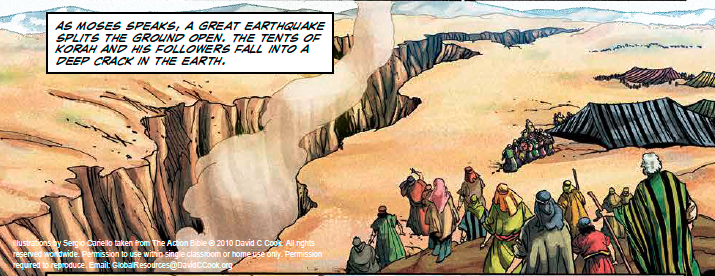
The Lord said to Moses and Aaron, “Separate yourselves from this assembly so I can put an end to them at once.” But Moses and Aaron fell face down and cried out, “O God, the God who gives breath to all living things, will you be angry with the entire assembly when only one man sins?” Then the Lord said to Moses, “Say to the assembly, ‘Move away from the tents of Korah, Dathan and Abiram.’”… As soon as he finished saying all this, the ground under them split apart and the earth opened its mouth and swallowed them and their households, and all those associated with Korah, together with their possessions.
Numbers 16:20–24, 31–32
Situation 3: Joseph was his father’s favorite son. Because of this, his brothers hated him. In fact, they hated him so much that they sold him into slavery in a faraway country. He lived as a slave for many years. Joseph was imprisoned and mistreated. But God was with Joseph, and he eventually became a man of great wealth, power, and influence in Egypt. However, his brothers were not doing well. There was famine in their country, and they had no food. They ended up going to Egypt and were reunited with Joseph, though they did not recognize him at first. Eventually the whole family moved there. After their father died, the brothers were afraid Joseph would take revenge on them. So the brothers went to Joseph to seek his favor.
Now let’s hear the ending from the Bible.
Ask a student to read Genesis 50:18–21 aloud from the Bible.
Show The Action Bible image of the brothers with Joseph if possible.
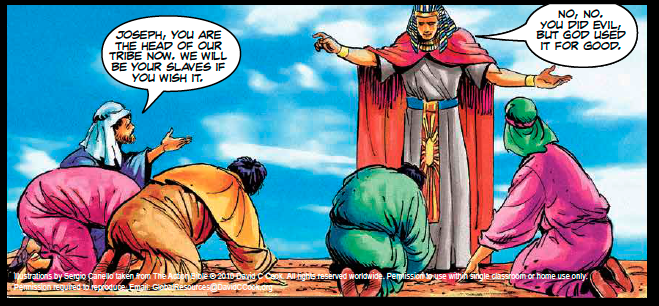
His brothers then came and threw themselves down before him. “We are your slaves,” they said. But Joseph said to them, “Don’t be afraid. Am I in the place of God? You intended to harm me, but God intended it for good to accomplish what is now being done, the saving of many lives. So then, don’t be afraid. I will provide for you and your children.” And he reassured them and spoke kindly to them.
Genesis 50:18–21
Let’s talk about how forgiveness can work with justice. This is what the Bible tells us about justice.
Ask a student to read the following verse aloud from the Bible.
For we must all appear before the judgment seat of Christ, so that each of us may receive what is due us for the things done while in the body, whether good or bad.
2 Corinthians 5:10
It tells us that we will all answer for what we have done in this life.
You may think that forgiving means there will be no consequences for the person who hurt you. But this verse says that everyone will answer to God for what he has done. We do not have to try to make the other person pay the price for what he or she did wrong. We can recognize that what has happened to us is not fair or right, but we can trust that God will deal with the person who mistreated us. We can trust God to bring justice.
You may also be struggling with guilt or shame for what someone forced you to do. For example, in the situation from the Bible, Tamar felt shame from being raped. Perhaps you may think you are unlovable or that what you have done is unforgivable. But God wants us to release our anger, bitterness, pain, and shame so He can heal our hearts and give us His peace.
God’s forgiveness can transform your life. Even in our most difficult situations, when we release our anger and pain to God, we can experience His grace and peace. Let’s read what the Bible says about this.
Create in me a pure heart, O God, and renew a steadfast spirit within me.
Psalm 51:10
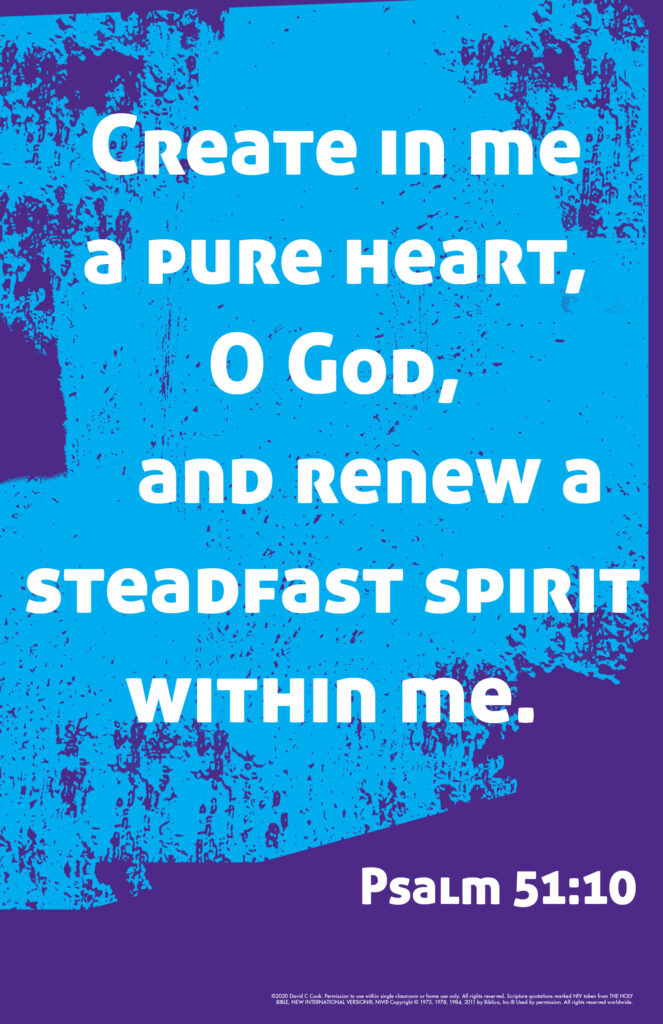
Allow students to share their thoughts. Be sure they mention that God can cleanse those who confess their sins to him and make them pure and clean in His eyes.
Place the basin of water at the front of your space. Students will have the opportunity to wash their hands in the basin as a symbol of God washing the pain and anger out of their hearts and replacing it with forgiveness.
We now have an opportunity to wash away the hard things we have carried in our lives. We can choose to let forgiveness begin to reshape the landscapes of our hearts.
Think about someone you need to forgive. Think about how the situation makes you feel. Some of these feelings may be dark, angry, or sad. Do you want to release them? If you are a Christian, you can choose to ask God to wash your heart and replace these hard things with His love and peace. Even if you are not yet ready to follow God, you can choose to release your negative emotions and begin to forgive.
Now think about something you need to be forgiven for. It may be something you have done to someone else—or even something you are struggling to forgive yourself for. You can let go of these feelings of pain and anger as well. If you are a Christian, you can ask God to heal this pain. Even if you have not yet chosen to be part of God’s family, you can think about the feelings and start releasing the pain from your heart.
Demonstrate washing your hands in the basin as you share the next part of the lesson.
If you want to wash the pain and anger out of your life, you can wash your hands in this basin. As you do this, think about God’s forgiveness washing away all the hurt, anger, and bitterness in your heart. If you are not ready to do this activity, you can choose to stay seated and quietly think of what you can do to bring forgiveness into your heart.
Optional: If you are using the Student Pages, the teens can write their thoughts on these pages.
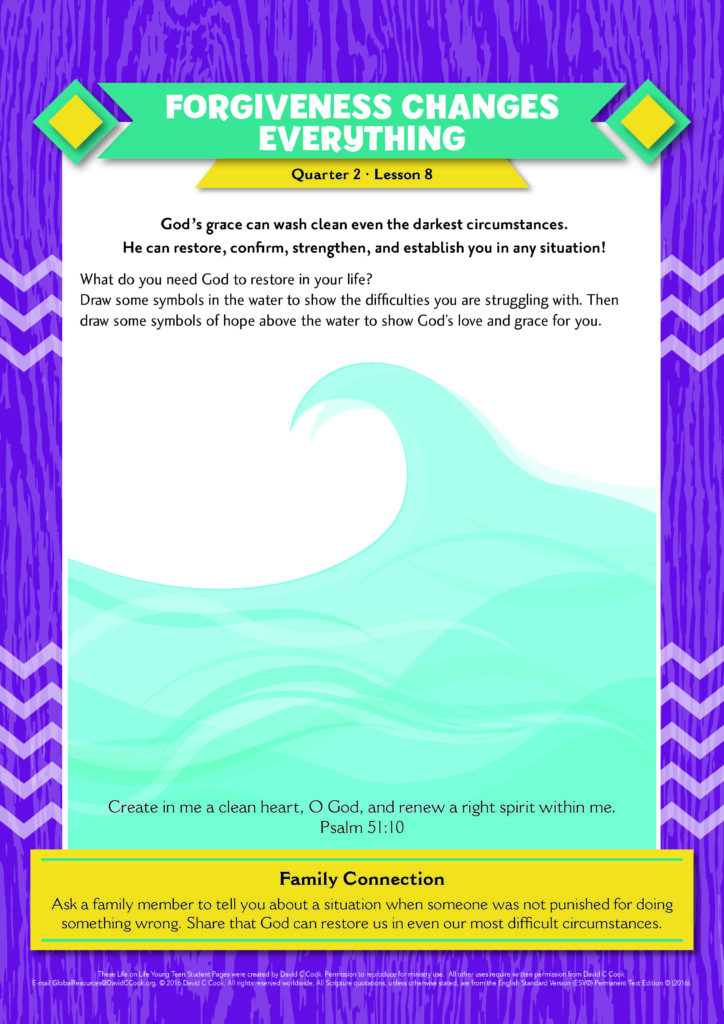
Give the students a few minutes to respond. Once the response is over, pray a blessing over them based on 2 Peter 1:2–4.
Blessing: May grace be yours in abundance through Christ. May you know the comfort of His promises and the true peace that comes only from Him.
Lead your students in singing this quarter’s song as they see that they can worship in any circumstance.
Life on Life ©2020 David C Cook. Reproducible for home or classroom use only. All other uses require written permission from David C Cook [email protected]. All rights reserved.